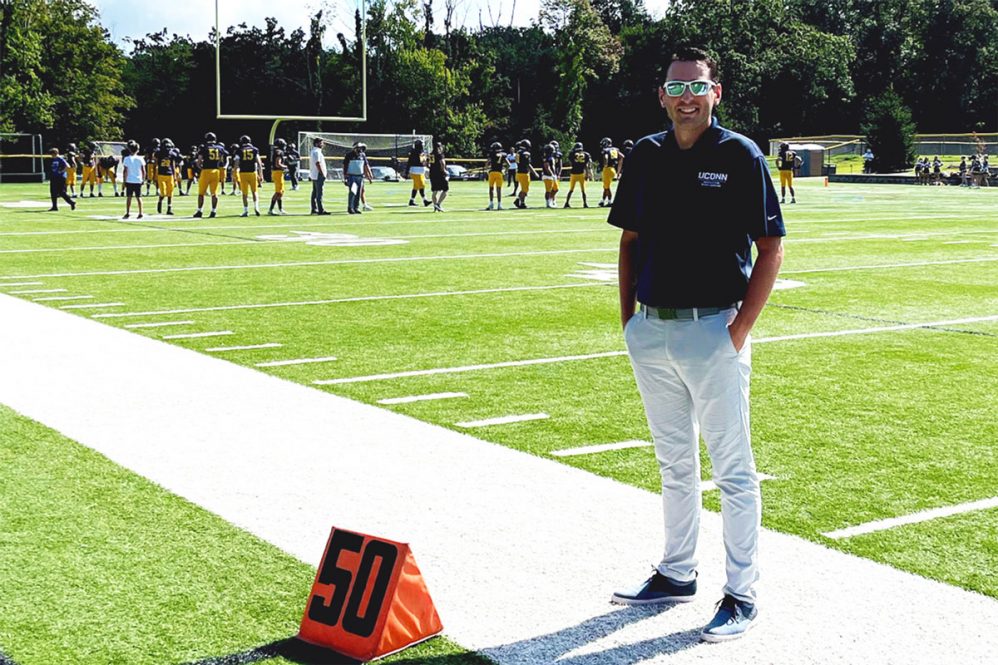This fall sports season, athletes at the Woodstock Academy have UConn experts on their team.
Designed to bring together the sports medicine expertise within UConn Health and the injury prevention and rehabilitation services within the Department of Kinesiology in the College of Agriculture, Health and Natural Resources, the UConn Institute for Sports Medicine and the Woodstock Academy have formed a new partnership focused on offering next-level resources and care to these high school athletes.
To just have a team of people invested in our school and our students, and to come to our school with that attitude, has been really great. — Woodstock Academy Athletic Director Sean Saucier
In his role as team physician, Dr. Zachary Maass, one of UConn Health’s sports medicine specialists, will be present for football games as well as basketball games and other teams’ home games. But his service goes beyond the sideline.
“What we’re offering, first and foremost, is streamlined access for all of their athletes to get in and get the care they need should an injury happen,” Maass says. “On top of that, we’re providing onsite physician training rooms. I go there every Thursday afternoon and see any athletes who need to be seen. Then on top of that, on an as-needed basis, we’ll mobilize different resources from the Institute for Sports Medicine, whether it’s a dynamic warmup education or a throwing program for the baseball players, based on what the school wants.”
Justin Bolton, one of the UConn Institute for Sports Medicine’s athletic trainers, works with the school’s athletic training staff and covers games when needed, and helps facilitate care when an athlete needs to be seen.
“Depending on the injury and its severity, being seen quickly in an orthopedic office can be pretty crucial to the athlete’s recovery,” Bolton says. “Our relationship with the Woodstock Academy enables a streamlined service for that athlete to get the care he or she needs.”
The UConn Institute for Sports Medicine and the Woodstock Academy, a private high school in northeastern Connecticut with 25 varsity teams and about 300 athletes per season, have been working together in a less formal capacity for more than a year, on a limited basis because of the pandemic-related slowdown of high school athletics.
“We are fortunate to have two athletic trainers on staff, but with that many teams and athletes, they get overwhelmed constantly,” says Sean Saucier, Woodstock Academy athletic director and football coach. “When you’re dealing with athletes, some high-level athletes, that access to care — getting an MRI within 48 hours, for example — is a tremendous resource.”
This summer, Maass brought other UConn Health sports medicine physicians and athletic trainers to the Woodstock Academy campus to perform several dozen preseason physicals.
“We are excited to team up with Woodstock Academy’s athletic trainers and coaches to provide best-practice care from prevention to safe return to sport,” says physical therapist and athletic trainer Laurie Devaney, co-director of the UConn Institute for Sports Medicine. “This partnership offers great opportunities to expand access to care for student-athletes and is important to our research mission at UConn.”
Other elements of the UConn-Woodstock partnership include emergency action plans and injury prevention programs. And if an injury is such that surgery is recommended, it’s a natural gateway to UConn Health orthopedic surgeons and a best-practice rehabilitation program for safe return to play.
“They’re clearly passionate about what they do,” Saucier says. “To just have a team of people invested in our school and our students, and to come to our school with that attitude, has been really great.”



